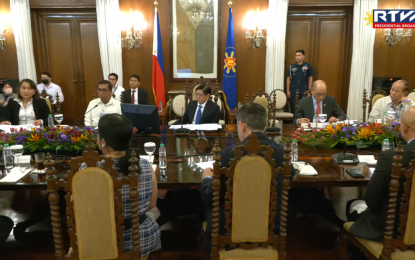MANILA – President Ferdinand R. Marcos Jr. on Thursday sought to fast-track the digitalization of database of farmers and food balance sheet (FBS) to strengthen the country’s agricultural industry.

DIGITALIZATING AGRICULTURE. President Ferdinand R. Marcos Jr. meets with members of the Private Sector Advisory Council’s Agriculture Sector Group at Malacañan Palace in Manila on Thursday (Feb. 23, 2023). Marcos wants the speedy digitalization of farmers’ registry and food balance sheet to develop the country’s agricultural industry. (Screenshot from Radio Television Malacañang)
This developed after Marcos met with the Private Sector Advisory Council’s (PSAC) Agriculture Sector Group at Malacañan Palace in Manila, Presidential Communications Office (PCO) Secretary Cheloy Garafil said in a statement.
Garafil said Marcos welcomed the PSAC’s proposal to digitize the farmer registry and the FBS, as he acknowledged the need to update the processes and systems in the agriculture sector.
“Well, if we can [get] digitalization in place as quickly as possible…everyone needs it. So, what you need to do is you get the system in place, specific for the agriculture. Hopefully, it will become part eventually of the government system,” Marcos, as quoted by the PCO, told the members of PSAC’s Agriculture Sector Group.
To date, over 5.4 million farmers, farm workers and fisherfolk have registered under the national Registry System for Basic Sectors in Agriculture (RSBSA).
Registration in RSBSA is voluntary. It is the basic requirement in availing of agri-fishery related government services, particularly for the programs and projects of the Department of Agriculture (DA).
The RSBSA has three main components: farmer and fisherfolk profiling, farm parcel georeferencing and the interventions monitoring system.
On the other hand, the FBS, compiled by the Philippine Statistics Authority, is an aggregated and analytical data set that presents a comprehensive picture of the pattern of a country’s food supply during a specified reference period.
The FBS provides estimates of per capita food available for human consumption in terms of quantity, calories, protein and fat contents.
The PSAC told Marcos that food security in the country could be attained, if there is a digital FBS that would promote transparency and ensure data-driven policy decision-making, according to a Facebook post by state-run Radio Television Malacañang (RTVM).
Citing the PSAC’s presentation, Garafil said countries such as Kenya and Indonesia are already using digital FBS which could be set up within 12 weeks.
“The PSAC pointed out that the digital FBS would include real-time data and accelerate change in the agriculture sector,” Garafil said. “The proposed FBS is foreseen to increase the income of small-holder farmers and result in additional government budget savings.”
The PSAC also recommended to Marcos, the concurrent DA chief, the creation of an FBS Committee composed of individuals from the public and private sectors, Garafil said.
“The council said that fixing storage, logistics and coupled with the FBS, will be an effective way to go about reaching the country’s target to attain food security in sugar, rice, coconut as well as livestock,” she said.
Strengthening coconut industry
Meantime, Garafil noted that there was also a proposal from the PSAC to earmark around PHP1.2 billion for the distribution of coconut seedlings.
Marcos welcomed the council’s recommendation, Garafil said.
“Marcos also welcomed the PSAC’s recommendation on replanting coconut trees by distributing more seedlings, allocating around PHP1.2 billion and training farmers in intercropping to increase their productivity,” she said.
“The chief executive likewise recognized the proposal of the PSAC to use common salt as fertilizer for coconuts as it would improve the quality and quantity of the expected yield,” Garafil added.
RTVM said the meeting at Malacañan was attended by several industry leaders, including Aileen Christel Uygongco-Ongkauko of La Filipina Uy Gongco Corporation who heads the PSAC’s Agriculture Sector Group.
